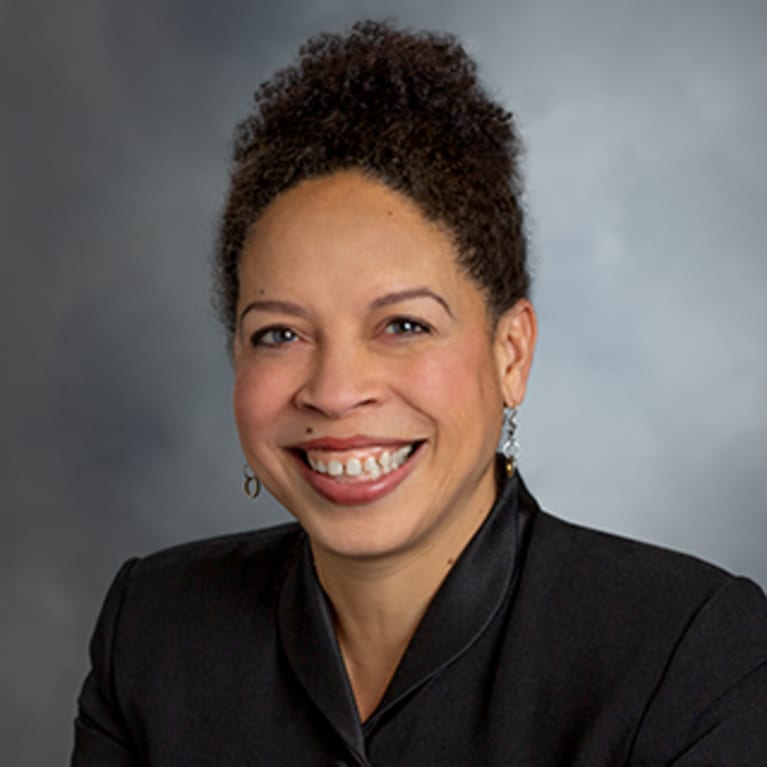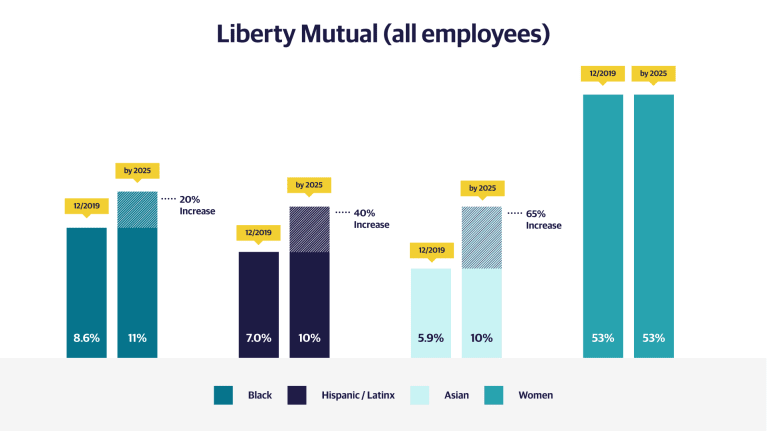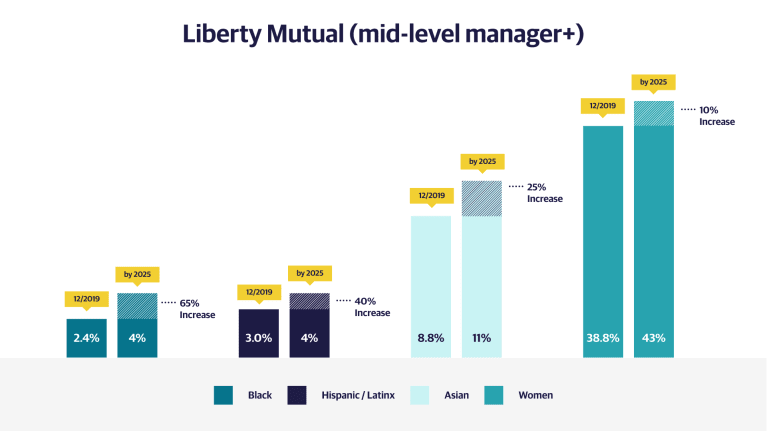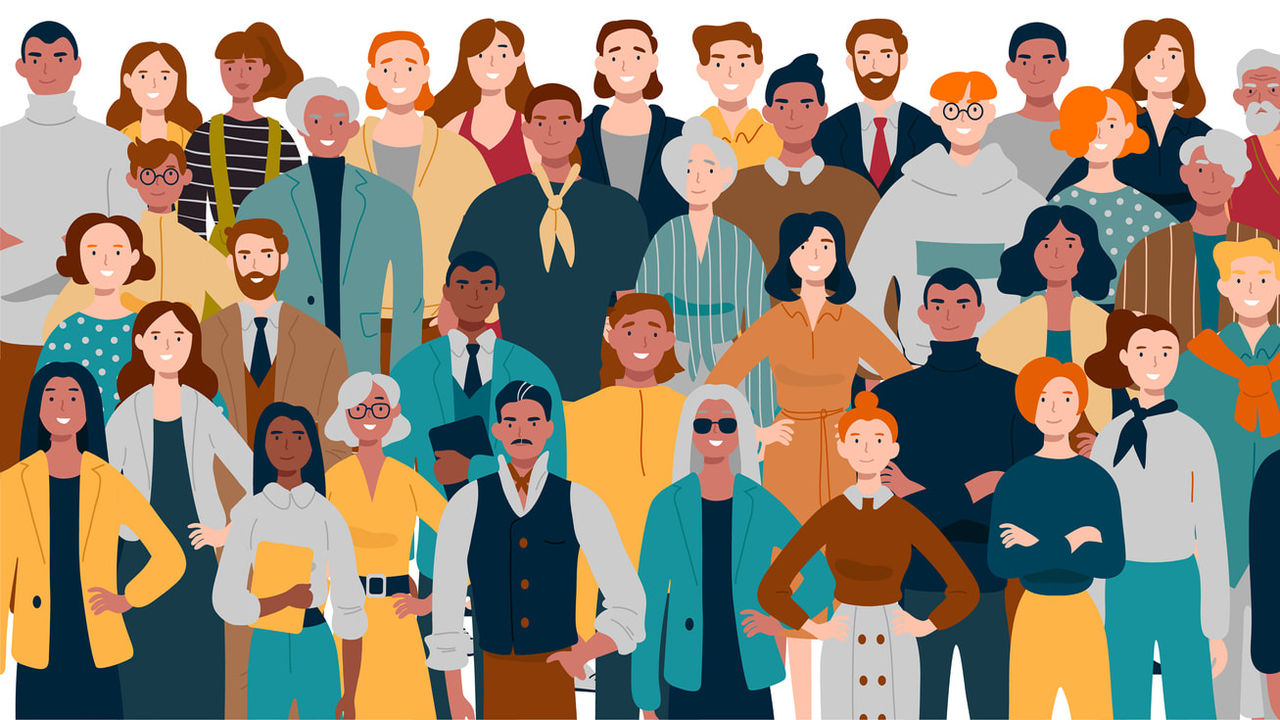Liberty Mutual Insurance, headquartered in Boston and part of an industry that historically has been dominated by white men, has been recognized in recent years for its commitment to diversity, equity and inclusion (DE&I), along with its executive vice president, global DE&I officer, Dawn Frazier-Bohnert.
Frazier-Bohnert joined Liberty Mutual Insurance in 2013 as senior vice president and chief DE&I officer. In both roles, she has worked to reshape the 50,000-member company as it addresses its commitment to DE&I. She also has served in other HR roles throughout her career. 
Her work has been noticed. Diversity Woman Magazine included her among its inaugural "Elite 100" Black Women Leaders list in 2020, and the National Diversity Council listed her as one of top 100 diversity officers that year. Liberty Mutual also has racked up its share of DE&I awards:
- 2021, DiversityJobs.com named it a top employer.
- 2020, Military Times listed it as a top employer for veterans.
- 2020, Forbes named it as one of the best employers for women for the third consecutive year.
- 2020, Fortune magazine included it on its list of best workplaces for diversity for the second consecutive year.
- 2020, received a 100 percent Corporate Equality Index rating from the Human Rights Campaign Foundation for policies and practices related to lesbian, gay, bisexual, transgender and queer workplace equality for the third consecutive year.
- 2020, Boston Women's Workforce Council recognized the company's WE@Liberty Women and Allies employee resource group's self-care events.
SHRM Online spoke with Frazier-Bohnert, who leads a 25-member DE&I staff, to learn about the company's multiyear DE&I plan and how it is making sure those goals are met.
The following comments have been edited for clarity and length.
SHRM Online: What is the company's current level of representation of women and people of color, and what are one or two goals for raising that number?
Dawn Frazier-Bohnert: We employ around 23 percent of people of color in the U.S.; women make up about 51 percent or 52 percent. But like many companies, we start to see those numbers change [decrease] as we move up the organizational chart.


The first chart above illustrates Liberty Mutual's demographics in the U.S. as of Dec. 19, 2019, and its overall DE&I staffing goal for 2025. The second chart illustrates the demographics of the company's midlevel managers in the U.S. and its DE&I goal for this cohort for 2025.
Source: Liberty Mutual Insurance
SHRM Online: How is progress, or its lack, measured? Who is accountable and how are they held accountable?
Frazier-Bohnert: We have a strong talent analytics team at Liberty, and they are strong partners with our DE&I office and all of HR. Both my DE&I team and HR work with talent analytics to set those measures, to look at the reporting of that information and even setting aspirational goals.
We look at hiring, advancement and retention, since all three things are what impact representation. You need all three areas working together to address representation. If you only focus on hiring and do not pay attention to advancement and retention, you likely create a revolving door of talent and will not make progress. People will not stay if they don't see career promotion.
We look at our employee opinion survey; we do pulse surveys throughout the year around belonging. We ask, "Do employees feel connected? Do they feel that they have advancement opportunities?"
Beginning this year, we launched a "leader objective," which is part of our performance management process. We made it a part of every global people managers' 2021 goals and objectives to be an inclusive leader. The objective sets expectations to help them understand the behaviors required to be effective and how they will be held accountable for demonstrating inclusion. We have provided them with an inclusive leader toolkit among many other support resources.
All managers are accountable for the climate they create, not just for the DE&I numbers.
SHRM Online: What do you mean by managers being accountable for the climate?
Frazier-Bohnert: Managers have the most direct impact as to how people feel connected. … We're still in the process, but we know—and we've heard through focus groups or opinion surveys—if employees don't feel connected to the company, it's because they don't feel connected to their team or their leader, and/or they don't feel they are being seen. If you're the only woman on the team, how do I make sure you have a broader network? That's the manager's job, to help team members feel connected and be as productive as possible. I believe that can only happen if employees feel that they belong and are valued.
SHRM Online: Liberty Mutual created an award-winning e-learning video series, "Inclusion in Action" that focuses on nine skills for employee communication and collaboration. How is this used with employees?
Frazier-Bohnert: We built this video series into our onboarding. Leaders might use [a module] in a huddle break as a refresher. This is more about behavior and to encourage people to pause and try on someone else's perspective. We knew that to move from awareness to putting inclusion into action, we needed to talk about behaviors, and this was in response to that.
We did commercialize it and make it available to others, with proceeds going to a nonprofit in Boston.
SHRM Online: Liberty Mutual created a group of DE&I advisors. What does that entail?
Frazier-Bohnert: This year, the company invested in expanding the DE&I office. I hired three DE&I subject matter experts and a project/program manager for each of them to help advance our DE&I efforts. The advisors are aligned to Liberty's business units and corporate departments. Having them allows my office to directly connect to what is happening in the business and departments.
These senior DE&I leaders can tailor our enterprise strategies as appropriate for the business. They consult, advise and assess needs to help us evolve our solutions. They partner with the HR talent advisors and take DE&I programs, practices and tools into the middle of the organization, where we have not been able to reach given the size of my team. They report to me and have a dotted-line reporting relationship into the executive HR leaders in the business. While they have only been in role since mid-January, we have early indications that this new structure will help accelerate our efforts.
Advertisement
An organization run by AI is not a futuristic concept. Such technology is already a part of many workplaces and will continue to shape the labor market and HR. Here's how employers and employees can successfully manage generative AI and other AI-powered systems.
Advertisement



